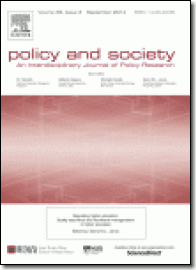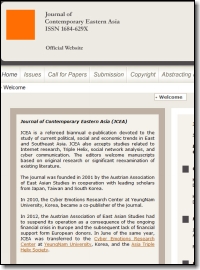
Darryl S.L. Jarvis Director
Contact Details:
Prof. Darryl S.L. Jarvis
Department of Asian and Policy Studies
The Hong Kong Institute of Education, Hong Kong
E-mail: darryl.jarvis[at]apisa.org

Christian Schafferer Co-Director
Contact Details:
Assoc. Prof. Christian Schafferer
Department of International Trade
Overseas Chinese University, Taiwan
E-mail: c.schafferer[at]apisa.org
The Higher Education in Asia Program was launched in 2014 and consists of two research units:
1) Higher Education Policy in Asia: Reform, Outcomes, Equity and Access
The political economy of Asia has experienced profound change over the last thirty years or so. Much of this transformation, of course, rests in the on-going expansion of Asian economies, deepening economic growth and generally increasing national incomes. Indeed, this transformation has often been enthusiastically celebrated, marking an epochal change in terms of the rise of the East as economies in Asia leap-frog ahead of their developed counterparts. A recent article in the Financial Times (October 8, 2014), for example, reported findings by the International Monetary Fund that in terms of Purchasing Power Parity (PPP), China was now the world's largest economy, while Indonesia had overtaken the United Kingdom to become the 10th largest economy in the world.
If such absolute epochal transformations are to be believed, commensurate achievements in the development of human capital should also be apparent. Indeed, historically, investment in Asia's higher education sector was identified as a key driver of the region’s transformation, attracting considerable resources and policy attention. But after thirty years of sustained investment into the sector, what outcomes have resulted? What role has higher education played in supporting economic and social transformation in the region? While participation rates have trended upwards, commensurate increases in higher education institutional quality or global research innovation, impact and leadership still trails in international league tables. The recent UNESCO report, Higher Education in Asia: Expanding Out, Expanding Up - The Rise of Graduate Education and University Research (May, 2014), for example, notes that the research performance and postgraduate educational outcomes in Asia’s higher education sector are not reflected in 'over all rankings,' with Asia underrepresented in international league tables such as Academic Ranking of World Universities, QA World Universities Rankings, and the Times Higher Education World University Rankings (pp.65-66).
This research unit seeks to examine developments in the higher Education sector in Asia in terms of
- the achievements of the sector over the last thirty years or so (participation rates - access and equity, resources, research, impact and quality);
- recent developments in the sector in terms of funding (public versus private), policy innovation, research, internationalization and rankings, and
- challenges and future prospects for higher education in Asia.
2) Higher Education: Policy, Governance and Regulation
Higher education has become an increasingly important focus for governments around the world. This reflects four interrelated developments. First, the growth in the strategic importance of the sector to national economic development, economic innovation, wealth and value creation as a result of the intensification of knowledge based competition between economies, has elevated the sector to the forefront of government economic planning. Second, greater student mobility and the emergence of an international market for higher education has commoditized the sector, with governments keen to reap export income from the provision of fee-based education. Third, declining state fiscal capacity in an environment where expectations about participation in higher education have continued to rise, has forced policy experimentation, with governments adopting new public management strategies as a means to ensuring sector sustainability. Finally, rapid sector expansion has witnessed the emergence of a more complex education supply chain comprised of both public and private service providers, challenging traditional bureaucratic systems in the management of the sector.
Collectively, these developments have precipitated significant innovation and change within the sector over the last 30 years. The introduction of neo-liberal managerial practices, new public management tools, accountability and transparency regimes, along with performance based assessments and metrics, has changed fundamentally the operating environment of academic labour, approaches to scholarship, knowledge transfer, and pedagogy.
This research unit seeks to assess these developments, their outcomes, and the implications for higher education from both a comparative and country case study perspective. In particular, this research unit invites critical engagement with the impact of these new forms of sector governance on issues such as equity, access, quality, academic labour practices and related issues.
Current Activities and Publications
International Conference on Public Policy (ICPP)
Milan, Italy, July 1-4, 2015
Download document in PDF
APISA will take part in the conference and has its own panel:
| Higher Education Policy in Asia: Reform, Outcomes, Equity and Access | |
| Topic: 02 | Comparative Public Policy |
| Chair Panel | Darryl S.L. Jarvis, Hong Kong Institute of Education |
| Co-Chair | Joshua Ka Ho Mok, Hong Kong Institute of Education |
| Discussant | Giliberto Capano, SCUOLA NORMALE SUPERIORE, palazzo Strozzi, Florence, Italy, and University of Bologna, Italy |
Call for paper: 15 November 2014 - 15 January 2015
Link to organizer
Policy and Society Vol. 33, No. 3 (2014)
Regulating Higher Education: Quality Assurance and Neo-liberal Managerialism in Higher Education
Edited by Darryl S.L. Jarvis

Link to publisher
Journal of Contemporary Eastern Asia Vol.12, No. 1 (2013)
Bullying in Higher Education in Taiwan: The Taiwan Higher Education Faculty Survey (THEFS)
Christian Schafferer and Andrew Szanajda

Link to publisher
